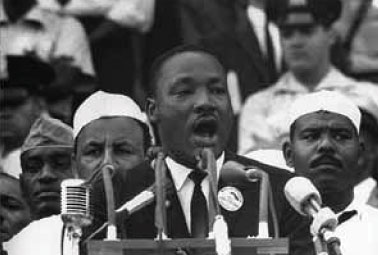March on Washington for Jobs and Freedom
August 28, 1963
Written by Shmuel Ross
 |
|
|
Martin Luther King, Jr., Giving the “I Have a Dream” Speech. United Press International. |
The March on Washington for Jobs and Freedom took place in Washington, D.C., on August 28, 1963. Attended by some 250,000 people, it was the largest demonstration ever seen in the nation's capital, and one of the first to have extensive television coverage.
1963 was noted for racial unrest and civil rights demonstrations. Nationwide outrage was sparked by media coverage of police actions in Birmingham, Alabama, where attack dogs and fire hoses were turned against protestors, many of whom were in their early teens or younger. Martin Luther King, Jr., was arrested and jailed during these protests, writing his famous "Letter From Birmingham City Jail," which advocates civil disobedience against unjust laws. Dozens of additional demonstrations took place across the country, from California to New York, culminating in the March on Washington. President Kennedy backed a Civil Rights Act, which was stalled in Congress by the summer.
 |
|
|
A view of the rally from the Reflecting Pool by Nat Herz |
The March on Washington represented a coalition of several civil rights organizations, all of which generally had different approaches and different agendas. The stated demands of the march were the passage of meaningful civil rights legislation; the elimination of racial segregation in public schools; protection for demonstrators against police brutality; a major public-works program to provide jobs; the passage of a law prohibiting racial discrimination in public and private hiring; a $2 an hour minimum wage; and self-government for the District of Columbia, which had a Black majority.
President Kennedy originally discouraged the march, for fear that it might make the legislature vote against civil rights laws in reaction to a perceived threat.
Once it became clear that the march would go on, however, he supported it. The march was also condemned by some civil rights activists, including Malcolm X, who felt it presented an inaccurate, sanitized pageant of racial harmony.
The two most noteworthy speeches came from John Lewis and Martin Luther King, Jr. Lewis represented the Student Nonviolent Coordinating Committee, a younger, more radical group than King's. John Lewis’s speech stated:
“The revolution is at hand, and we must free ourselves of the chains of political and economic slavery. The nonviolent revolution is saying, ‘We will not wait for the courts to act, for we have been waiting hundreds of years. We will not wait for the President, nor the Justice Department, nor Congress, but we will take matters into our own hands, and create a great source of power, outside of any national structure that could and would assure us victory.’ For those who have said, ‘Be patient and wait!’ we must say, ‘Patience is a dirty and nasty word.’ We cannot be patient, we do not want to be free gradually, we want our freedom, and we want it now. We cannot depend on any political party, for the Democrats and the Republicans have betrayed the basic principles of the Declaration of Independence.”
King's speech remains one of the most famous speeches in American history. He started with prepared remarks, saying he was there to "cash a check" for "Life, Liberty and the Pursuit of Happiness," while warning fellow protesters not to "allow our creative protest to degenerate into physical violence. Again and again, we must rise to the majestic heights of meeting physical force with soul force." But then he departed from his script, shifting into the "I have a dream" theme he'd used on prior occasions, drawing on both "the American dream" and religious themes, speaking of an America where his children "will not be judged by the color of their skin but by the content of their character." He followed this with an exhortation to "let freedom ring" across the nation, and concluded with: “And when this happens, when we allow freedom to ring, when we let it ring from every village and every hamlet, from every state and every city, we will be able to speed up that day when all of God's children, Black men and white men, Jews and Gentiles, Protestants and Catholics, will be able to join hands and sing in the words of the old Negro spiritual, "Free at last, free at last. Thank God Almighty, we are free at last."






